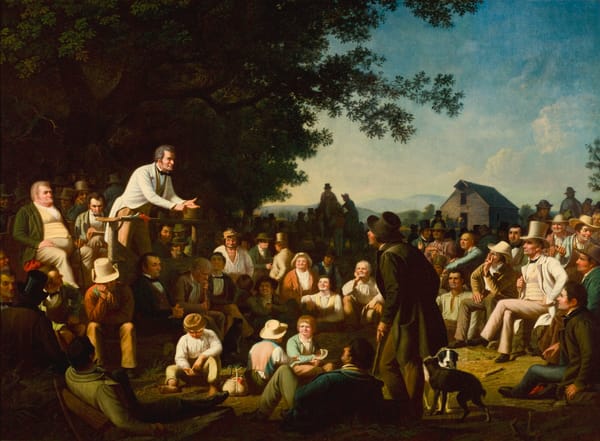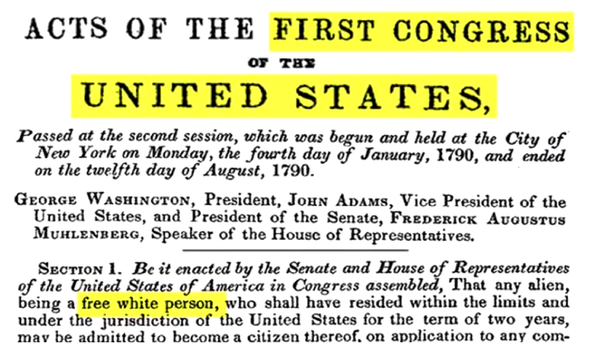Considerations on the Mahler vs. White Debate and the Sanctification of the Races
By promoting a healthy sense of racial identity, White Christian ethno-nationalists can authentically love and respect our Black neighbors.

The dust seems to have settled from the debate over Black sanctification between Corey Mahler and James White that took place earlier this summer. I doubt that many minds were changed as I believe that most people are likely to believe that “their guy” won. I don’t like the framing of the debate as Mahler seemed to be disadvantaged by the debate question: whether or not God could theoretically sanctify Blacks in general to the same extent as Whites. Mahler was tasked with trying to defend the notion that nature somehow limits God’s ability to extend grace.
I think that Mahler actually did a decent job of trying to reframe the debate during cross examination in which he pointed out to White that God cannot do the metaphysically impossible like ceasing to exist or be God, and that there are things that he hypothetically could do, but nevertheless typically chooses not to do this side of eternity. This includes things like miraculous healings or giving mankind the ability to fly. James White had little patience for this line of questioning as he seemed to miss the points that Corey Mahler was raising and insisted that Mahler’s questions were off topic.
White seemed to concede Mahler’s point that the races are not presently equally sinful or conversely, equally sanctified. White and his ilk might be irritated by the statistics that Mahler brought to the debate, but the reality behind them went unchallenged. Most Christians aren’t particularly bothered by the suggestion that people are sinful or holy to varying degrees. What is controversial is the observation that the degree of sinfulness or sanctity seems to correlate with racial differences. Most modern American Christians desire to treat people as individuals, with any broad trends being dismissed as mere happenstance. But this doesn’t seem to comport with the fact that the prophets frequently address nations of people as a collective whole. It also is too far removed from our collective common experiences. Whatever the causes of racial differences, the differences themselves are undeniably real.
This naturally leads any reasonable inquirer to ask why the races are different in terms of their present sanctity and proclivity towards sin. It’s certainly plausible that at least some of these differences are rooted in biology based upon the differences in our physical genes, but another factor that needs consideration is that these differences are located in the soul. Many Christians today seem to believe that the soul is a de novo, generically human creation of God made at the conception of a new human baby. But Christianity has a proud tradition of affirming traducianism, which is the belief that the human soul, like the physical body, is created from the parents of a child. This of course has implications for how we understand the inheritance of different traits or characteristics. We can demonstrate that many things like intelligence and personality are heritable, and traducianism seems to provide us with additional explanatory power in accounting for these differences. This can also help us to explain what the Germans describe as the volksgeist or the spirit of a particular people.
This seems like a likely explanation for racial and ethnic differences in things such as proclivities to certain vices or conversely, to virtue. The reality of race is consistently born out in things like crime statistics. Aside from the penchant of Blacks and to a lesser extent Hispanics towards violent crime, this also explains the Oriental, or East Asian proclivity for collectivist totalitarianism. All of this is consistent with the soul being inherited from parents who in turn inherited their traits from their ancestors. I believe that a corollary to this is that it is entirely possible for racial sanctification to occur by virtue of the Holy Spirit being poured out onto a particular people. Regeneration works directly on the soul in a way that the body is usually not affected. For example, repentance and conversion almost never results in a man re-growing or healing amputated limbs, but it can and at least in time should help someone overcome his sinful habits. The result of this conversion, if it were to happen on a large scale, would presumably benefit future generations as well.
The result of mass conversion of Blacks would result in repentance from violence, egalitarian envy, and sexual promiscuity. Similarly, the conversion of Jews would necessarily result in their repentance from hatred of God, their acceptance of Jesus as Messiah and God incarnate, as well as their repentance for subversion of European Christian countries. The re-conversion of Whites to Christianity would lead to repentance for our playing the part of Esau and selling our birthright to those who hate us in order to secure momentary material comfort. Those who profess Christianity and yet live just like the world are almost certainly making a false profession of faith. This means that the Christianity of many Black churches is discernably false.
The spiritual benefits of conversion in which the dead works of the flesh are mortified and the fruit of the Spirit is produced would be more immediate than changing other aspects of a people’s nature that have been affected by sin and the fall. Race realists are absolutely correct to point out that Christian conversion doesn’t heal physical wounds, make you smarter, better at sports, musical performance and composition, or better at creating art, architecture, literature, etc. But does this mean that abilities are absolutely static? I’ve ruminated on this topic for a while and an acquaintance that I’ve interacted with on Facebook named Keon Garraway mentioned a concept that we could call, “inter-generational sanctification.”
The premise is simple enough. As a group of people is converted to Christianity and given time to bear the fruit of the Holy Spirit, this will impact them beyond the immediate benefits of their initial conversion. As genuine Christians, they would value Biblical justice which punishes violent crime swiftly without showing favoritism to protected classes who are not considered culpable due to their unfortunate circumstances (Ex. 23:3/Lev. 19:15). The other side of the coin is that these new Christians would reject egalitarian envy that serves as the foundation for false “social justice” while learning to highly esteem the superior members of the group. This would have a eugenic effect upon the overall population, with benefits spanning far beyond the first generation converts.
How would this impact Black people for example, which at present seem to occupy the bottom of the racial totem pole by many metrics? We could imagine that conversion would make Black Christians stop sympathizing with thugs and murderers, stop glorifying fornication and sexual degeneracy, and start valuing hard work and honesty. The result would be that a good many Blacks, genuine converts or otherwise, would face true Biblical justice when they transgress God’s Law. This means that residual inclinations to violence would be gradually bred out of the Black gene pool as violent offenders would be forcibly removed.
The converse would also be true. Members of the “talented tenth” or the top ten percent of the Black population would be esteemed for their God-given talents and abilities. They would be encouraged to exercise and invest their time, talent, and treasure for the betterment of their people as a whole. They would be encouraged to marry and be fruitful and multiply. Both the removal of degenerates and the proliferation of those with the greatest aptitude among them will have a benefit that is realized after many generations. This understanding of sanctification of the races avoids the pitfalls of believing pious egalitarian platitudes that don’t ultimately originate from Scripture or comport with reality.
Christians can take different positions on the likelihood of this happening prior to the return of Christ, and differences will likely reflect how one views eschatology. The overall point is that God can indeed sanctify the different races. There is no question that any Christian of goodwill naturally will desire this to happen. Ironically, well-meaning Christians espouse policies that have hindered genuine progress for the advancement of Blacks and other non-Whites. Mass migration to America and Europe, among other problems, has created a “brain drain” in Africa and other non-White lands as the most capable non-Whites seek greater economic prosperity abroad rather than applying their talents to improving the conditions of their ancestral homelands.
The common practice for Black men who achieve economic success—to marry White women—also typically demonstrates a selfish concern for moving up the social ladder rather than taking a wife from their own people. Social taboos against miscegenation benefit all races, but in particular would benefit Blacks by requiring them to marry and propagate thoroughbred lines of capable Black descendants. Even W.E.B. DuBois, himself a mixed-race Black man who popularized the phrase “talented tenth,” worried that the talented tenth would miscegenate rather than marry back into the Black population. Finally, integration had the unintended consequence of killing off fledgling Black businesses and institutions like Negro League baseball in which Blacks had a unique ownership stake.
The best thing for Black sanctification and advancement after they genuinely receive the Gospel would be to encourage and perhaps eventually require at least to some extent their repatriation back to Africa and or other areas that are designated for Black settlement where they can assume the responsibility for creating a society based upon the principles of God’s Law expressed in a uniquely African context. This will allow Black Christians to take ownership of their successes and failures and learn from past mistakes. Many who align with the positions espoused by Samuel Sey and James White in their debates with Corey Mahler seem to care about taking the more comfortable approach of promoting egalitarianism and avoiding the very real racial problems that everyone faces, rather than fleshing out what Black sanctification must entail and what must happen for it to be accomplished. By promoting a healthy sense of racial identity, White Christian ethno-nationalists can authentically love and respect our Black neighbors. “Faithful are the wounds of a friend; but the kisses of an enemy are deceitful” (Prov. 27:6).
ATTENTION READER: We need your help.
Institutional trust is at record lows. But without institutions, we cannot renew our people, much less provide an inheritance to posterity. In response to this crisis and as an organic outgrowth both of necessity and natural interest, American Mantle exists, not only as a publication for Protestant, right-wing material, but also as a human project with real-world costs. And so we make our appeal.
Donate to the Cause. Help us reach our monthly goal in order to solidify this crucial institution.







